Menu
Table of contents
Well, that could be due to one of 13 reasons below (or several reasons at once, of course).
Reason 1: there has been a Google update
Google says it makes several small updates every day to make its algorithm (read: search engine) better. But in addition to those small daily improvements, there are also a few major updates every year.
Now, Google may be targeting your niche more strictly because you are covering a particular topic. Indeed, that happened in 2018 after the Medic Update was rolled out and all sorts of medical websites saw their rankings disappear like snow in the sun
But it could also be that Google is going to look at your Web site in a different way. They did that in 2021, for example, with the Core Web Vitals.
Whatever the adjustment will be, an update could either put your Web site at a disadvantage or put your competitors ahead. And in a worst-case scenario, both happen at the same time.
So have you been overtaken by your competitor? If so, first check to see if there was a Google update recently. And if so, do research on what has been updated.

Reason 2: The order of search results is not right for you
Reason 2 is that you are not actually caught up, but it looks like you are caught up because you are not looking incognito or the location is impacting search results.
After all, if you visit your own Web site a lot and leave it quickly, Google may rank other search results higher. Because Google knows you're not happy with that result.
Therefore, always make sure to check your position in Google with an SEO tool made for that purpose. Don't fiddle around or incognito yourself.
We primarily use SEMrush and SERPWatcher for this purpose.
In addition to your search history, your location also has an impact on search results. This is because Google knows that when you type in "plumber," you are looking for a local party, not one located 200 kilometers away.
You also tackle this problem by using the right tool.
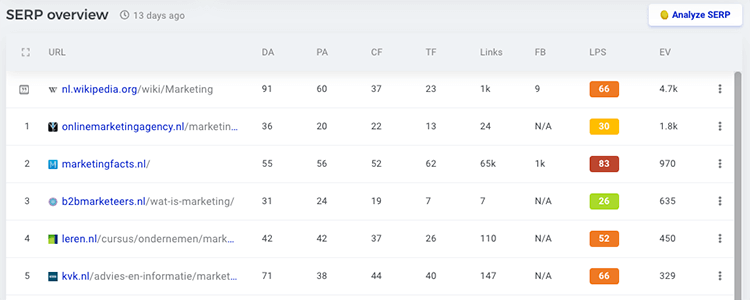
Reason #3: Your competitor writes better content
As you may already know, search engine optimization consists of three factors:
Which of the three is really most important? And whether content is really king, I dare not say. After all, without a fast website, your content is useless and without backlinks, a fast website is useless.
What I do believe in is that content has become increasingly important over the past year and is going to become more important in the coming time. This is because I believe that Google is going to get stricter and stricter in terms of authority and that soon everyone will have a good website technically.
In other words, chances are that your competitor has caught up with you because his content is better and/or more comprehensive and better suited to his target audience. He may have designed his blog or landing page better, have more internal links, use the keyword better or simply be more responsive to the reader's needs.
And of course, it may be that a (new) competitor has written a new text and therefore ranks higher, or it may be that an existing competitor has improved an existing text.
Reason 4: Your competitor has started link building.
In reason 3, I briefly mentioned authority. The authority (is a fictitious number coined by SEO nerds) that a website has depends on all sorts of things. For example:
- How old your domain is
- How many backlinks you have
- How the quality of those backlinks is
And the latter two, of course, involve link building: getting links to your website from other websites.
Links can be bought in, you can trade them and you can get them for free. There are many ways how you can obtain them. I won't go into that too much right now.
But what I do want to address is that your competitor has caught up with you because he/she has started link building or has started accelerating in link building.
After all, that means the authority of your competitor's website is rising. And if the technology and content are equally good, you're going to lose out in terms of authority.
The downside of link building is that it often has to do with who has the biggest wallet. Because in many cases, the one with the biggest wallet can pick the best links.
Should your competitor have much bigger budgets and work with an SEO specialist who gets it a little bit, chances are slim that you will win.
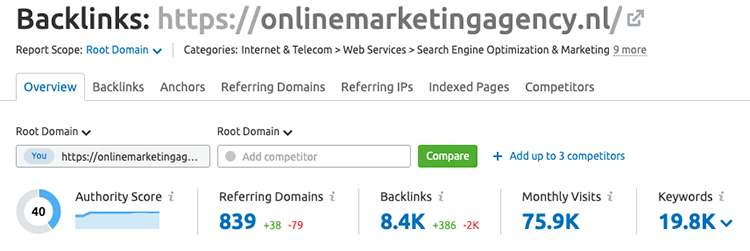
Reason 5: Important backlinks to your website have been removed
Of course, it could be that your competitor has created more links, but of course, it could also be that backlinks to your website have been removed.
And when those are links from quality and relevant website, that may be why your competitors have overtaken you.
Because the links have been removed, your website is a lesser authority in Google and that can cause you to have dropped.
Reason 6: Your website is down due to a technical glitch
Of all the reasons in this list, this one is actually the most comprehensive. Not so much that it is difficult to explain what a technical defect is, but because there are so many technical defects that can cause your competitor to overtake you.
Consider problems with:
- Noindex
- Disallow
- Canonical
- Nofollow
- Server / hosting
- Loading time
- Redirects
- HTTPS/SSL
- Structured data
The effect of these problems range from not so much to your website can no longer be indexed and does not appear in Google at all.
And when you have multiple technical defects at the same time, then you have a problem altogether. So it's really important to make sure that all these technical issues are in constant order.
Should you want to read more about these technical flaws, I recommend you read my blog The 16 Most Common Technical Mistakes.
And should you want to find out for yourself if your website has many technical flaws, I recommend you read my blog Technical SEO: 11 tools for greater insight.
Reason 7: Your website has dropped because of bad backlinks
If you're a little further along with SEO yourself, then you know how important links to your websites are. Now, you may have purchased a link building package yourself on Fiverr, from an online marketing agency or your regular SEO specialist has created/purchased links.
When their quality is poor, it can cause you to sink in Google. This is because Google does not like it when you buy poor quality, irrelevant or foreign backlinks.
This is because she has realized this immediately. The consequences can be a penalty (more on this later) but also a small "tap" in the search results. The tap can be seen as a yellow card with soccer.
The penalty can be seen as a red card.
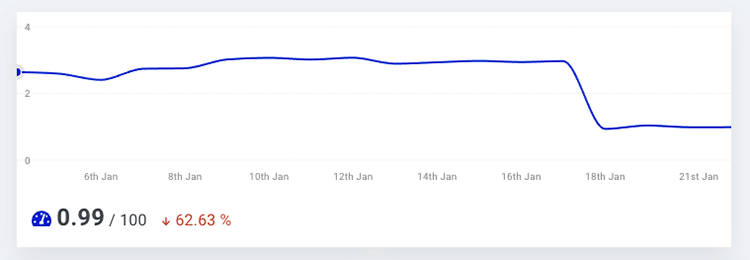
Reason 8: You're in the same spot, but there are now ads above your result
Do you suddenly see a whole bunch of search results above your search result? Does it happen to say 'Adv.' and do you see all kinds of features you don't?
Then you haven't dropped, but that means there are ads above your search result. That may have been true for some time, of course, but your niche may have exploded all at once, causing all kinds of parties to jump on it now.
Then you'll still rank #1 organically, but you'll definitely lose some clicks to your paying competitors. Should these keywords be very important to you, get started with Google advertising yourself.
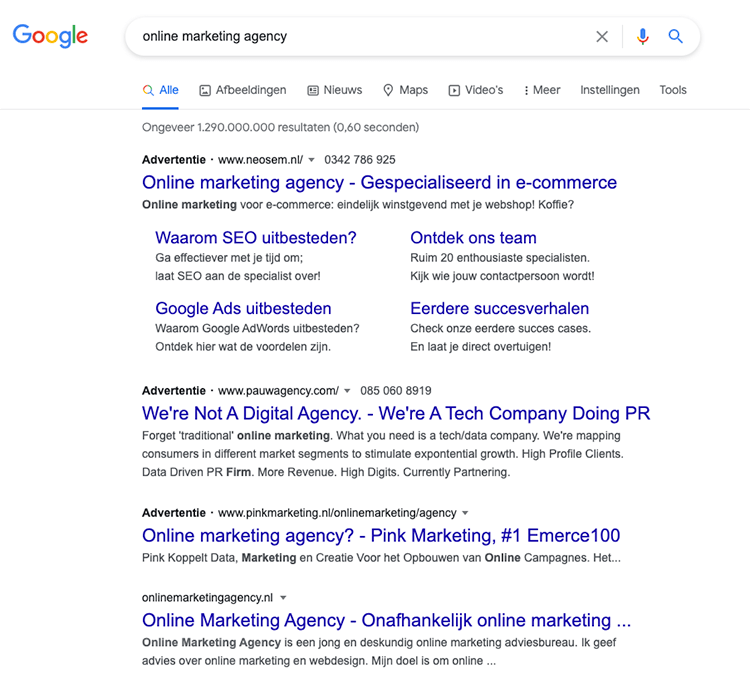
Reason 9: Two or more pages within your site are competing with each other
In addition to killing your own link profile by buying bad links, there is another way you can be overtaken in Google by your competitor.
The fact is, you can also have competition within your own website. Now you're thinking: how then?
Well, actually quite simple. Suppose you have written 4 blogs all about cargo bikes. How is Google supposed to know which article is most important to you? And more importantly, which article about cargo bikes is the best for visitors to read?
Google will do its best to rate them all, but even Google doesn't know which one is most important to you.
Now you can indicate that with internal links (the more, the more important). But if all articles have the same number of links, then Google is completely in the dark. You have internal competition and Google can't pick and choose.
When your competitor has not four blogs about cargo bikes, but one powerful article that covers all those four components, then you lose twice. Because then you also lose out on content.
Ps. Internal competition on keywords is also called keyword cannibalization. And SEMrush has a very handy tool for that.

Reason 10: The content has been modified in a bad way and Google does not rate the page as well because of this
At reason 3, I told you that your competitors can start writing better content. And at reason 7, I told you that you can kill your link profile yourself by buying bad links.
We combine the two at reason 10, which is to kill your own Google ranking by adjusting your text the wrong way.
Did you want a different page title anyway? And didn't like that H2 after all? If you changed it, you may have accidentally taken out the keyword.
As a result, your text no longer aligns well with the searcher's intent in Google. Your text is less relevant and Google will show competitors who do have good text above you.
Therefore, always make sure you look carefully at what you are adjusting. Discuss this with your SEO guy (or gal) and don't adjust anything without thinking.
Reason 11: Your website does not meet today's standards
Actually, reason 11 belongs with the reason about technical defects and with the reason about the Google update. But I think it's so important that I will treat it separately.
In fact, it still happens that people have a website that is not suitable for mobile devices (Yes, I also wonder how that is possible). And it still happens that people have a website that is terribly slow.
Of course, you could see this as a technical glitch or an update in which Google is tinkering with the impact of ranking factors. I couldn't agree more.
But this is also one that is and will become important in the future. Is your website inclusive enough? Is your website capable on all the latest devices? Does your website meet all of Google's new requirements? Is it no longer using outdated HTML?
These are all things that are important and impact your position in Google.
Reason 12: Your competitor has supplemented their Google My Company
When I start a blog, I first think of all the headings. Once I have determined those, I always ask my colleagues to take a look.
And Colleague Tom came up with a great idea. Namely, you can also get caught up in Google My Company.
You know. That one little block in Google with the locations.
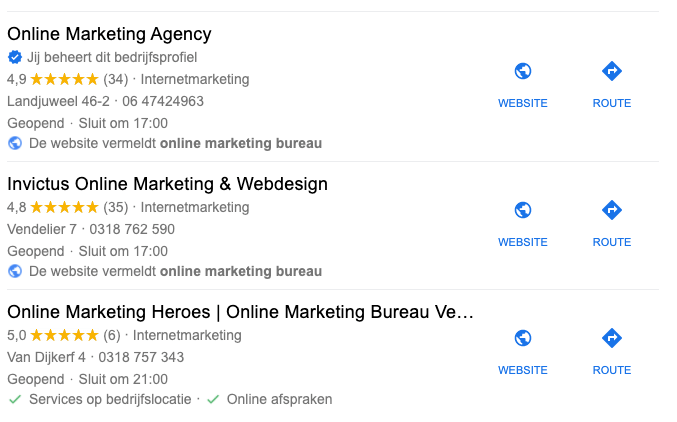
You can optimize your Google My Company all the way. When your competitor has done that and when he has completed the rest of his profile, you may also be caught up within Google Maps.
Reason 13: You have received a Google penalty
*Whistle from the referee* RED CARD! PENALTY!
If you don't follow Google's rules, then you could face a penalty. Now you're thinking: what exactly does that mean, a penalty?
That could mean losing some positions in search results. But if you've gotten very out of hand, it could also mean being thrown out of Google's search results entirely.
And how can you get such a penalty? By not following Google's rules. And some of those rules you can find here.
This article was written on Jan. 29, 2021 and updated on Sept. 17, 2023.


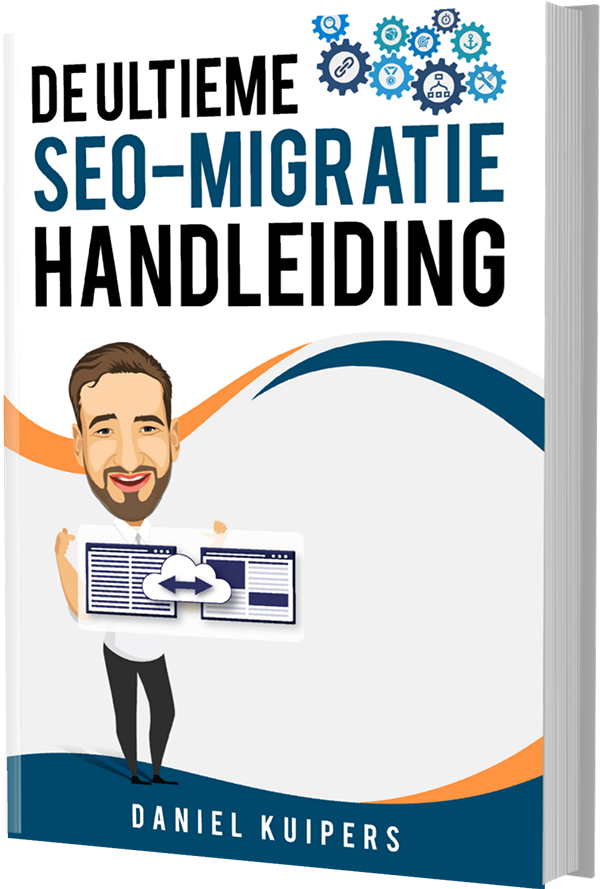

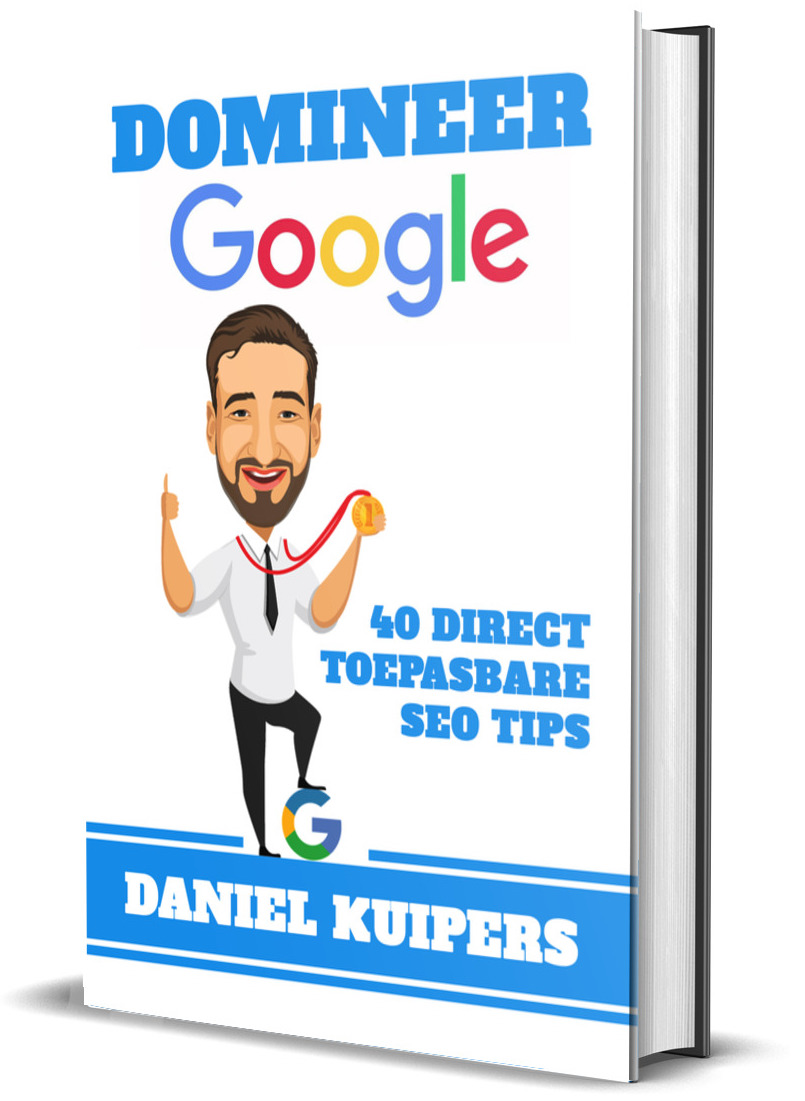



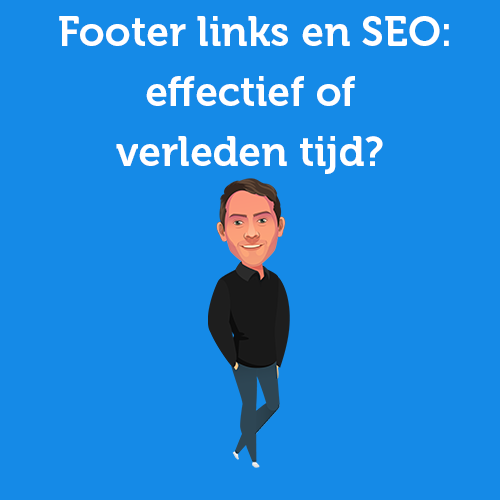
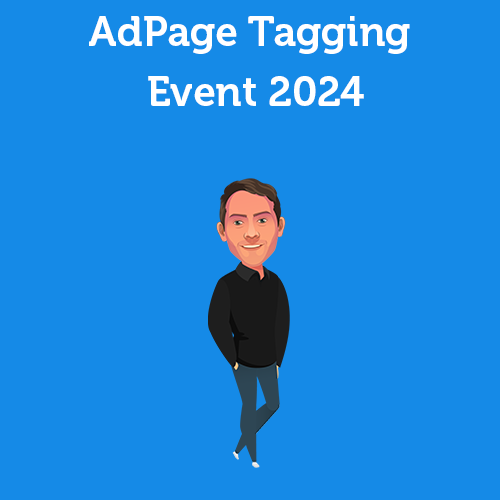
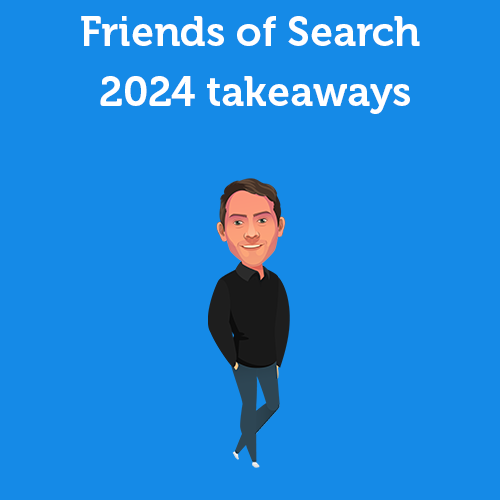
Written by: Daniel Kuipers
Daniel is the founder of Online Marketing Agency. He constantly scours the Internet for the latest gadgets and tactics and blogs about them in understandable language. Well, sometimes.